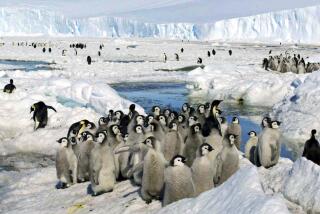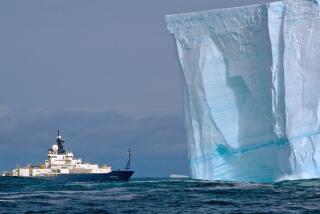A long, arduous journey, but at least they look sharp
If you had to walk 70 miles to get a date, fast for months at a time and sleep standing up, you might start to appreciate the simple things in life. The emperor penguins of the Antarctic do those things and much more, all with Zen-like grace (broken by the occasional pratfall), simply to perpetuate the species.
As the “last tribe” of Antarctica, the emperors have outlasted countless other living things over millions of years, unique in what they endure to survive. Each season beginning in March, they embark on a nine-month ritual, leaving their watery homes in the icy sea -- these are birds that cannot fly but are exceptional swimmers -- and waddle across the white glacial masses to their remote breeding grounds, the only habitable area available to them during the harsh winter months.
Luc Jacquet’s gripping documentary, “March of the Penguins,” packed with more romance and nail-biting adventure than a summer of tent-pole movies, chronicles the emperors’ arduous journey in intimate detail that draws you in emotionally to such an extent that you’ll be shocked back to reality when the end credits remind you that a crew of humans had to be present to capture the drama.
The long march to the breeding grounds is made single-file with the penguins scooting along the ice like a group of portly snowboarders. When they tire, the birds and their Belushiesque physiques get horizontal, sliding headfirst on ample bellies like wrong-way lugers. Instinct finally delivers them to the Pointe Geologie archipelago, where they sing -- a kind of mechanized trilling -- to find a mate with whom they remain monogamous for a single season.
The conditions are brutal, with some of the most inhospitable weather on the planet, yet the penguins’ courtship is unexpectedly tender. Each mate will remember the other’s distinct song so that they will be able to reunite throughout the cycle of enforced separations.
The couple produces a single egg that the mother passes to the father in a ceremony with great delicacy. If the egg touches the ice for more than a few seconds it will freeze. The father balances the egg atop his claws for two months, protected from the elements by only a flap of skin. The mother then makes the reverse crossing back to the sea, having not eaten for months and lost one-third of her body mass. She and the other mothers who survive the trek approach the underwater buffet of krill, fish and squid with a gusto that gives the words “Finding Nemo” new meaning. Meanwhile, the fathers are embracing their maternal sides while enduring temperatures that reach 71 below zero.
During this time, the egg hatches and the father attempts to keep the chick alive until the mother returns to feed it. Then it is the father’s turn to visit the sea (a ramble that may take 20 days). As the chick grows stronger, the parents alternately repeat the weeks-long food runs. The trip grows more treacherous as winter increases the ice and distance to the sea. Predators such as orcas, leopard seals and giant petrels (ugly gull-like creatures) also threaten the birds’ survival. If one parent does not return with food, the baby penguin will die. There is no backup.
When narrator Morgan Freeman says, “The worst is yet to come,” he’s not kidding. This is not, however, a bleak film in any sense of the word. “March of the Penguins” is as uplifting as anything you will find in theaters as the birds’ struggle encompasses all the elements of great drama. Jacquet risks over-anthropomorphizing the penguins at times, but it’s a gamble that pays off. Most filmmakers try to give animals human traits for laughs by having them wear funny hats or giving them dialogue.
Jacquet does it through Freeman’s folksy reading of writer Jordan Roberts’ English-language narration (reminiscent of the old Disney nature films) and with witty editing. But rather than projecting human traits onto the penguins, what happens is that the audience begins to identify with these odd birds and their incredible journey, and through this empathy we feel more human.
*
‘March of the Penguins’
MPAA rating: G
Times guidelines: Some frightening moments may be too intense for small children.
A Warner Independent Pictures and National Geographic Feature Films presentation. Director Luc Jacquet. Producers Yves Darondeau, Christophe Lioud, Emmanuel Priou. English-language narration written by Jordan Roberts, based upon the story by Luc Jacquet, based upon the screenplay by Luc Jacquet & Michel Fessler. Cinematographers Laurent Chalet, Jerome Maison. Editor Sabine Emiliani. Music Alex Wurman. Running time: 1 hour, 20 minutes.
At the ArcLight Cinemas, 6360 Sunset Blvd., Hollywood, (323) 464-4226; and Laemmle’s Monica 4-Plex, 1332 2nd St., Santa Monica, (310) 394-9741.
More to Read
Only good movies
Get the Indie Focus newsletter, Mark Olsen's weekly guide to the world of cinema.
You may occasionally receive promotional content from the Los Angeles Times.











